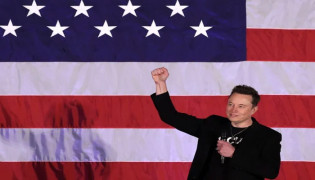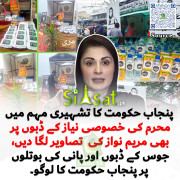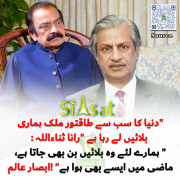Rana Tahir Mahmood
Senator (1k+ posts)
[h=1]Show me the difference[/h]By Nasir Jamal
December 15, 2011
 PTI rally in Lahore attracts huge crowds. Courtesy AFP.
PTI rally in Lahore attracts huge crowds. Courtesy AFP.
The details of PakistanTehreek-e-Insafs (PTI) agenda of change are, perhaps, the best guarded secret ofPakistans murky politics. All we have is at best a vague sketch of social, economic and administrative measures and at worst disjointed and random statements issued by PTI chief Imran Khan, mostly on the go. Our agenda is the agenda ofPakistan. It is all in the newspapers. Everybody knows what the issues are, says Dr Arif Alvi, PTIs secretary general.
While this reliance on newspapers betrays a lack of proper homework on the issues facingPakistan, the solutions PTI suggests reveal at least some degree of populist naivet. [Everybody knows] where the solutions are. We dont have to reinvent the wheel, says Alvi. All we need is [political] will and the [good] intention to fix the problems facing us.
The PTI, according to him, will strive to makePakistanan Islamic welfare state in accordance with the sayings of Quaid-e-Azam Muhammad Ali Jinnah as enunciated in his speech onAugust 11, 1947. It is to be a place where everyone will have equal rights and opportunities regardless of religious or socio-economic standing, he says. This should give you the broad contours of our programme, our manifesto, Alvi explains.
The problem is everyone inPakistan, barring a few religious and nationalist parties, swears by Jinnah and turningPakistaninto an Islamic welfare state remains a political mantra except for a few regional parties in Khyber Pakhtunkhwa, Balochistan and Sindh. Even more essentially, the state as defined by Jinnahs speech should have nothing to do with religion but an Islamic welfare state is nothing if it is not religious. How PTI reconciles this theoretical problem and its practical implications, in terms of an equal political and religious treatment of all Pakistanis regardless of their faith, will provide some clue to the partys political philosophy. Will it ever ask for revoking the clearly discriminatory clauses of the 1973 Constitution which stop non-Muslims from becoming the head of the state or the government? What about the blasphemy laws and Hudood ordinance?
At a mundane level, why is PTI so reluctant to provide details of its programme? We are not releasing the details because we do not want others to steal our programme, cut it and paste it as their own, Alvi insists.
While such secrecy and vagueness has so far helped PTI to attract supporters from the opposite ends of political spectrum, the partys critics and opponents say it shows that Khan as a politician is short on programme and long on political rhetoric. A Punjab-based federal minister of Pakistan Peoples Party (PPP) says, Khan wants to do a [Zulfikar Ali] Bhutto on us and on other political parties but without a political ideology to attract voters. He must be kidding. Wanting to remain anonymous, the minister says Khans statements and speeches have impressed him the least. What he said inLahorewas formless. Let him come up with a published manifesto and we will see how he is different from the rest of us and what he has to offer to different sections of society businessmen, middle classes, peasants, working classes, minorities, women, etc, he says.
Dr Hasan Askari Rizvi, a Lahore-based political analyst agrees. Khan does not have a plan of action, he says. Even if he has a plan, as he claims he has, it raises the next question. Does he also have the capacity, human resource and the will to implement what he plans to do? asks Rizvi.
Khans answers to complex economic, political, social and strategic problems seem to come straight from the opinions and editorials pages of newspapers and television talk shows. He wants to makePakistanan energy-surplus and self-reliant economy by exploiting the countrys natural resources. That these natural resources require money, technology and elaborate political, administrative and environmental measures does not seem to matter. For instance, most ofPakistans natural gas and coal reserves happen to be in Balochistan and Sindh and after the 18th amendment to the Constitution no federal government can extract and use them without the consent of the provincial governments. Does Khan propose to bypass such constitutional niceties, risking further distrust between the provinces and the centre or will he be willing to take the long and painful route of creating a national consensus on how to extract and use these natural resources for the common good of the country? The devil certainly lies in detail.
Khan says he will force politicians to declare their foreign assets and will bring back 100 billion US dollars they have looted from the people and stashed away in the Swiss banks. The most glaring omission in this is that he fails to mention the money taken abroad by generals, judges, bureaucrats and businessmen. But even if one is willing to overlook that, it will take a suspension of disbelief to accept that Khan will succeed where military dictators in spite of their totalitarian powers failed to establish the link between political corruption, Swiss bank deposits and foreign assets.
His solution to the economic problems is both short and simple: Pakistanloses 3,000 billion rupees annually to corruption and in unpaid taxes; if we succeed in stopping this loss (to the revenue) we can turn the economy around, woo fresh investment and achieve self-reliance, he told theLahorerally. In an undocumented economy like Pakistan, it is difficult to say if his statistics are authentic but even if they are correct, doing something about them will help Pakistan only balance its budget something that may be one of the many factors in an economic turnaround but cannot on its own put the economy on the right track. What about current account deficit, foreign loans, international and regional trade and, most importantly, a level playing field and an enabling environment?
Khans answer to the last is an end tothanaculture by depoliticising the police and abolishing patwaris by digitising the land records. How he will achieve this acrossPakistanunless he has his partys government in all the four provinces both police and land records being provincial subjects remains unknown. In an indication that he is not a fan of provincial autonomy, he opposes the 18th amendment which he says has concentrated too much power in the hands of the provincial chief executives. As a footnote to his centralising ideology, he talks about local governments without first talking about the devolution of power from the federal to the provincial level. This, again, has been a tried and tested policy of the military governments to avoid addressing the long-pending problems between the provinces and the centre as well as among the provinces.
In his Lahore rally, Khan pledged to remove the sense of alienation among the Baloch but did not say anything on the role of the military and bureaucratic establishment in creating this alienation, just as he did not touch the civil-military relations which lie at the core of many political crises that Pakistan has faced in the recent past.
Khan is pandering to urban, educated middle-classes inPunjab. He has, therefore, focused on issues like governance and reflected what is close to [the hearts of] his followers, argues Mohammad Waseem, a professor at the Lahore University of Management Sciences. He and his party are relying on his personality and his rhetoric againstPPP, PMLN [Pakistan Muslim League-Nawaz] and theUnited States, says the professor.
Some commentators, however, are prepared to cut him some slack for not having firmed up his agenda of change yet. Khan is just starting and theLahorerally was the first event to establish his credentials as a political force, says Sajjad Naseer, a political science professor at the Lahore School of Economics. As he moves forward and his campaign gathers momentum, he will crystallise his agenda, he reflects.
He agrees with Khan that the real issue inPakistanat the moment is poor governance and corruption but he is dismayed with PTI because its leader is speaking only of political corruption and not of corruption among bureaucratic and other institutions of the state. Accountability has to be across-the-board. You cannot be selective in accountability, Naseer argues and then answers his own doubts. Maybe Khan is not targeting others as a political tactic. Maybe, he will also start talking about institutional corruption when his campaign builds up.
Ultimately, it is up to PTI and its leader to decide if he wants to end ambiguity and uncertainty about his political programme. The onus is on Khan to prove that he is different and possesses what it takes to bring about real change, says thePPPminister. For the time being, PTI may prefer to remain non-committal on the core issues facingPakistanso as to avoid alienating potential supporters.
http://herald.dawn.com/wp-content/uploads/2011/12/immy-k-575-by-3001.gif
December 15, 2011
 PTI rally in Lahore attracts huge crowds. Courtesy AFP.
PTI rally in Lahore attracts huge crowds. Courtesy AFP.The details of PakistanTehreek-e-Insafs (PTI) agenda of change are, perhaps, the best guarded secret ofPakistans murky politics. All we have is at best a vague sketch of social, economic and administrative measures and at worst disjointed and random statements issued by PTI chief Imran Khan, mostly on the go. Our agenda is the agenda ofPakistan. It is all in the newspapers. Everybody knows what the issues are, says Dr Arif Alvi, PTIs secretary general.
While this reliance on newspapers betrays a lack of proper homework on the issues facingPakistan, the solutions PTI suggests reveal at least some degree of populist naivet. [Everybody knows] where the solutions are. We dont have to reinvent the wheel, says Alvi. All we need is [political] will and the [good] intention to fix the problems facing us.
The PTI, according to him, will strive to makePakistanan Islamic welfare state in accordance with the sayings of Quaid-e-Azam Muhammad Ali Jinnah as enunciated in his speech onAugust 11, 1947. It is to be a place where everyone will have equal rights and opportunities regardless of religious or socio-economic standing, he says. This should give you the broad contours of our programme, our manifesto, Alvi explains.
The problem is everyone inPakistan, barring a few religious and nationalist parties, swears by Jinnah and turningPakistaninto an Islamic welfare state remains a political mantra except for a few regional parties in Khyber Pakhtunkhwa, Balochistan and Sindh. Even more essentially, the state as defined by Jinnahs speech should have nothing to do with religion but an Islamic welfare state is nothing if it is not religious. How PTI reconciles this theoretical problem and its practical implications, in terms of an equal political and religious treatment of all Pakistanis regardless of their faith, will provide some clue to the partys political philosophy. Will it ever ask for revoking the clearly discriminatory clauses of the 1973 Constitution which stop non-Muslims from becoming the head of the state or the government? What about the blasphemy laws and Hudood ordinance?
At a mundane level, why is PTI so reluctant to provide details of its programme? We are not releasing the details because we do not want others to steal our programme, cut it and paste it as their own, Alvi insists.
While such secrecy and vagueness has so far helped PTI to attract supporters from the opposite ends of political spectrum, the partys critics and opponents say it shows that Khan as a politician is short on programme and long on political rhetoric. A Punjab-based federal minister of Pakistan Peoples Party (PPP) says, Khan wants to do a [Zulfikar Ali] Bhutto on us and on other political parties but without a political ideology to attract voters. He must be kidding. Wanting to remain anonymous, the minister says Khans statements and speeches have impressed him the least. What he said inLahorewas formless. Let him come up with a published manifesto and we will see how he is different from the rest of us and what he has to offer to different sections of society businessmen, middle classes, peasants, working classes, minorities, women, etc, he says.
Dr Hasan Askari Rizvi, a Lahore-based political analyst agrees. Khan does not have a plan of action, he says. Even if he has a plan, as he claims he has, it raises the next question. Does he also have the capacity, human resource and the will to implement what he plans to do? asks Rizvi.
Khans answers to complex economic, political, social and strategic problems seem to come straight from the opinions and editorials pages of newspapers and television talk shows. He wants to makePakistanan energy-surplus and self-reliant economy by exploiting the countrys natural resources. That these natural resources require money, technology and elaborate political, administrative and environmental measures does not seem to matter. For instance, most ofPakistans natural gas and coal reserves happen to be in Balochistan and Sindh and after the 18th amendment to the Constitution no federal government can extract and use them without the consent of the provincial governments. Does Khan propose to bypass such constitutional niceties, risking further distrust between the provinces and the centre or will he be willing to take the long and painful route of creating a national consensus on how to extract and use these natural resources for the common good of the country? The devil certainly lies in detail.
Khan says he will force politicians to declare their foreign assets and will bring back 100 billion US dollars they have looted from the people and stashed away in the Swiss banks. The most glaring omission in this is that he fails to mention the money taken abroad by generals, judges, bureaucrats and businessmen. But even if one is willing to overlook that, it will take a suspension of disbelief to accept that Khan will succeed where military dictators in spite of their totalitarian powers failed to establish the link between political corruption, Swiss bank deposits and foreign assets.
His solution to the economic problems is both short and simple: Pakistanloses 3,000 billion rupees annually to corruption and in unpaid taxes; if we succeed in stopping this loss (to the revenue) we can turn the economy around, woo fresh investment and achieve self-reliance, he told theLahorerally. In an undocumented economy like Pakistan, it is difficult to say if his statistics are authentic but even if they are correct, doing something about them will help Pakistan only balance its budget something that may be one of the many factors in an economic turnaround but cannot on its own put the economy on the right track. What about current account deficit, foreign loans, international and regional trade and, most importantly, a level playing field and an enabling environment?
Khans answer to the last is an end tothanaculture by depoliticising the police and abolishing patwaris by digitising the land records. How he will achieve this acrossPakistanunless he has his partys government in all the four provinces both police and land records being provincial subjects remains unknown. In an indication that he is not a fan of provincial autonomy, he opposes the 18th amendment which he says has concentrated too much power in the hands of the provincial chief executives. As a footnote to his centralising ideology, he talks about local governments without first talking about the devolution of power from the federal to the provincial level. This, again, has been a tried and tested policy of the military governments to avoid addressing the long-pending problems between the provinces and the centre as well as among the provinces.
In his Lahore rally, Khan pledged to remove the sense of alienation among the Baloch but did not say anything on the role of the military and bureaucratic establishment in creating this alienation, just as he did not touch the civil-military relations which lie at the core of many political crises that Pakistan has faced in the recent past.
Khan is pandering to urban, educated middle-classes inPunjab. He has, therefore, focused on issues like governance and reflected what is close to [the hearts of] his followers, argues Mohammad Waseem, a professor at the Lahore University of Management Sciences. He and his party are relying on his personality and his rhetoric againstPPP, PMLN [Pakistan Muslim League-Nawaz] and theUnited States, says the professor.
Some commentators, however, are prepared to cut him some slack for not having firmed up his agenda of change yet. Khan is just starting and theLahorerally was the first event to establish his credentials as a political force, says Sajjad Naseer, a political science professor at the Lahore School of Economics. As he moves forward and his campaign gathers momentum, he will crystallise his agenda, he reflects.
He agrees with Khan that the real issue inPakistanat the moment is poor governance and corruption but he is dismayed with PTI because its leader is speaking only of political corruption and not of corruption among bureaucratic and other institutions of the state. Accountability has to be across-the-board. You cannot be selective in accountability, Naseer argues and then answers his own doubts. Maybe Khan is not targeting others as a political tactic. Maybe, he will also start talking about institutional corruption when his campaign builds up.
Ultimately, it is up to PTI and its leader to decide if he wants to end ambiguity and uncertainty about his political programme. The onus is on Khan to prove that he is different and possesses what it takes to bring about real change, says thePPPminister. For the time being, PTI may prefer to remain non-committal on the core issues facingPakistanso as to avoid alienating potential supporters.
http://herald.dawn.com/wp-content/uploads/2011/12/immy-k-575-by-3001.gif


































